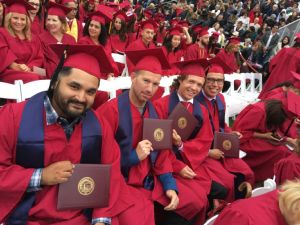

As part of its effort to bring more people who are deaf and hard of hearing into the STEM workforce, DeafTEC’s Project Good to Go works with California community colleges to provide resources for faculty who teach large numbers of military veterans.
“Hearing problems—including tinnitus, which is a ringing, buzzing, or other type of noise that originates in the head—are by far the most prevalent service-connected [disabilities] among American veterans,” according to the Office of Research and Development of the U.S. Department of Veterans Affairs (VA).
The list of Top Ten Things Student Veterans Would like Faculty to Know was developed by DeafTEC, the Technological Education Center for Deaf and Hard-of-Hearing Students at the Rochester Institute of Technology in New York, to raise educators’ awareness of the challenges student veterans face on college campuses and to share universal design for instruction practices that benefit veterans and other students.
Donna Lange, principal investigator of DeafTEC, says the ATE center’s personnel ask student veterans to participate in a survey when they work with them. The survey results provide a snapshot of student veterans’ perspectives on classroom experiences and the environment on their campuses. Survey data also provide information about the campus services that students use. Twenty-four of the student veterans who took the survey also participated in three focus groups at Saddleback College and Copper Mountain College that provided additional information from which the Top Ten list was developed.
DeafTEC receives support from the Advanced Technological Education program of the National Science Foundation.
Military-to-College Transition has Extra Challenges for Students Who Are Deaf or Hard of Hearing
Hearing loss can affect how people learn and socialize, Michael Sauter, an alternate media specialist at Saddleback College who also works with DeafTEC, explained during a presentation at the 2018 High Impact Technology Exchange Conference (HI-TEC).
For veterans with hearing loss starting college can be a “double whammy” as they transition to the culture outside the military structure and adjust to learning with different strategies and equipment because of their hearing loss, said Hira Byrne-Paulin. She was an ACCESS counselor at Copper Mountain College in California until mid-2018 when she entered a doctoral program. She is also an adjunct instructor for the Rochester Institute of Technology (RIT), which hosts DeafTEC within the National Technical Institute for the Deaf. The institute is one of nine RIT colleges.
“In the military you always know where you stand,” Byrne-Paulin said during the presentation, pointing out that military cultures’ expectations are different than those veterans encounter in higher education.
“It can be an overwhelming process. Not that they can’t do it. It’s just a new training,” she said, citing challenges that are more complicated for veterans with hearing loss. For instance, in the military people follow orders that come from the command and they gain information through very structured briefs. In college, instructors expect students to ask questions in class, participate in small discussions, and follow lectures even if the instructor turns away from the audience while writing on the board.
The Top Ten List from Student Veterans
To help bridge the gap between faculty and student veterans, DeafTEC developed the Top Ten Things Student Veterans Would like Faculty to Know:
- Attending college can be intimidating.
- “I have a VA appointment” is not the same as “I have a doctor’s appointment.”
- A classroom can feel like chaos.
- Seating selection is more than just a chair.
- Being accessible beyond the classroom builds connections.
- Communication is key for success.
- Recording a lecture can have a positive impact.
- Instructional delivery style can make a difference.
- Prepare, prepare, prepare!
- You are not alone in supporting your student veterans.
The rationale behind each point becomes visible by clicking on the interactive list on the Project Good to Go webpage http://good2go.org. In addition to helping faculty understand issues that affect veterans as they transition into higher education, more detailed information includes practical universal design for instruction strategies that support student veterans with hearing loss and all students in the classroom. For example the advice for point #6 is this: “Ask the student in private for ways to improve classroom communication and his/her preference for group work.”
Sauter said the insights and resources woven into the Top Ten list “help faculty be better educators … ultimately this will help anyone in the classroom.”
DeafTEC Resources for Educators & Employers
DeafTEC’s resources for faculty include online resources about universal design strategies and best practices for teaching deaf and hard-of-hearing students in STEM classes as well as professional development workshops.
DeafTEC also offers workshops and an online course to help employers create inclusive workplace environments that encourage communication among deaf and hearing workers to help all employees realize their full potential.
The STEM American Sign Language Video Dictionary, which DeafTEC developed with support for Dow Chemical Company, establishes sign language for technical terms in information technology, math, and lab sciences.

 Subscribe
Subscribe


 See More ATE Impacts
See More ATE Impacts

Comments
There are no comments yet for this entry. Please Log In to post one.